This month Walker Headlights are shining on one of our newest Parking Consultants, David Lieb. David joined our Denver office and Consulting Resource Group (CRG) early this year after serving as the Director of Parking and Transportation Services for the University of Colorado – Boulder. David’s impressive knowledge of Parking Operations, Transportation Demand Management (TDM), and University Campus Plans earned him our “Higher Education Specialist” title with Walker. Here is a little Q and A we put together to get to know David better:
What brought you into the parking/transportation industry?
An English major, of course. OK, maybe the connection isn’t so clear. I graduated from Cornell University and went to work for a group on campus (with whom I had worked as a student employee) called Communications Strategies – essentially an on-campus marketing, advertising, and market research firm. The office was working with prestigious clients such as Athletics, Admissions, and Alumni Affairs. As a junior analyst, when Transportation Services came in the door, I was assigned to that account (nobody else wanted it). I was very fortunate. Transportation Services was on the cusp of changing everything about how campus parking was operated – not just at Cornell, but what they were doing would change parking in higher education.
Cornell was among the earliest college campuses to consciously consider both sides of the supply and demand equation: instead of resigning themselves to addressing the perennial parking shortages only by building more parking, Cornell decided to introduce Transportation Demand Management or TDM, a set of incentives (and disincentives) to move people from single-occupancy commutes to carpools, transit, biking, and walking. We developed, marketed, and communicated these proposals and programs to the senior administration, campus community, and local community – and successfully implemented TDM. I left Communications Strategies and began working full time for Transportation Services. For the next 21 years, I worked my way up through the organization, getting a Master’s degree in community development along the way, until I left to become the director at CU Boulder.
What is the greatest benefit you can offer to clients through our parking study services?
Having spent 25 years in higher education parking and transportation services, I can offer university clients a real-world, practical, and empathetic perspective. I understand the ethos of a college campus—the collaboration of administration and self-governance, the intertwined and differing needs among campus constituencies, and the ebbs and flows of a community that operates in semesters. I find that these experiences translate well into our work with other institutions (hospitals, airports), municipalities, or even developers. I believe my engrained approach of considering shared-use of parking, of knowing when to build and when to consider not building additional parking, and of being a good steward of assets and physical infrastructure, fits Walker’s thoughtful and temperate approach to parking consulting, design, and restoration.
In your downtime, what do you like to do for fun?
I loved the Northeast; I’ve spent much of my life in Upstate New York, enjoying the water, hills, and lush green. I spend a lot of my time still amazed by Colorado: the mountains, vast open spaces, clear blue, and that bright thing in the sky that I didn’t see nearly as much of back East. My guilty pleasure is just sitting in my backyard in the sunshine looking at the mountains and reading. I am enjoying the quiet family time with my wife Antonia; although my daughter Olivia is 20 and my son Gabriel is 18, we remain close and enjoy each other’s company.
I also remain involved as a member of the board of directors of Ithaca Carshare, a local, non-profit organization that I helped found in 2008, and for which I served as board president until I left for Boulder. Ithaca Carshare was the first independent carshare organization (as opposed to for-profit corporate entities like ZipCar) in New York State, and at the time with only six cars, one of the smallest in the country. It is now a half-million dollar a year business, with a 24-car fleet and nearly 1,500 members.
When you attend special events in your free time, do you find yourself analyzing their parking and wayfinding?
Absolutely! Parking is often the first and last experience and impression you have with an institution, a business, or a community. It can, and often does, shape individuals’ emotional responses. But, yes, for me it is certainly a more conscious than subconscious experience – it becomes a lens through which you see the rest of the world. Having spent 27 years of my life at Cornell as both student and employee, I was often called upon to give tours to friends, family, and other visitors. I would catch myself describing campus development – beautiful new buildings, new academic programs, extraordinary initiatives – in context of the parking that was lost or gained; sometimes with a wistful or sentimental air.
CRG disciplines travel the country frequently – so far where has your favorite work-related visit been?
In my brief tenure, I have been to north Texas; Rockville, Maryland; and Scottsdale, Arizona. Scottsdale has been my only visit of more than 24 hours and so had the opportunity to be the most interesting. I was impressed by what that city has done to make it an oasis with greenery and frequent water features, so it doesn’t feel like a city built in a desert (although I was struck by a day of 2% humidity!); and the landscape is fascinating: the broad flat expanses with hills of rock randomly cropping up through the earth.
What makes a college campus truly unique? Have any stood out for doing things differently?
As I said earlier, Cornell was among the first campuses to develop TDM strategies; other late 80s and early 90s pioneers were the University of Washington, University of Wisconsin-Madison, CU Boulder, and numerous institutions throughout California. I’ve been fortunate to work for two of them. What allowed this to happen at these universities, and at hundreds since then, is one of the features that makes college campuses unique – they can serve as living laboratories. These relatively insular communities, built around education can be experimental. Universities can extend the educational experience beyond the classroom into the full campus environment. At Cornell and CU Boulder, with robust and heavily subsidized transit programs, I believe we created formative experiences that have sent college graduates out into the world accustomed to and supportive of public transit – who have a world view that doesn’t necessitate the use (or even ownership) of a car.
What do you think will be the newest innovation in PARCS (Parking Access and Revenue Control Systems) equipment in the coming years to make parking even more efficient on campuses?
From a customer service perspective, I really like the pay-by-phone option; instead of paying a meter with coins (who likes to carry those around?), bills (feeding a finicky bill acceptor), or even using a credit card reader, you simply use an app on your smartphone. The slickest feature of this service is that you get a text alert if your meter is about to expire, and you can easily extend your time without a panicked run out to the meter. From a parking-management perspective I am keen on pay-by-plate, which allows quick and easy enforcement using license plate recognition (LPR). But, for me it is more about the people than the technology, about service-oriented staff. Ultimately, a system that is perceived positively will create a better experience for users and managers.
If your campus has complex parking needs and is searching for solutions, please contact David.



